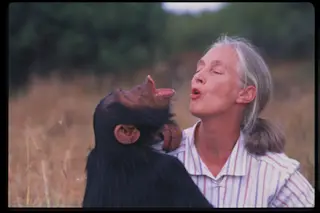Chimpanzees get AIDS. This is an important discovery, but what intrigues me most about it is how the discovery was made. It is a story of two kinds of science, both of which are essential to getting a deeper understanding of life, but which today are staggeringly out of balance. In the 1960s, Jane Goodall carried out some of the first long-term studies on chimpanzees in the wild. Goodall made important observations, noting that chimpanzees can be surprisingly cooperative but also quite violent, with troops engaging in war-like conflicts. Goodall's research was part of a long tradition of going to where the animals are, and tracking them for years on end. Goodall didn't take giant crates of lab equipment with her to Tanzania; instead, she brought patience and careful observation. Of course, doing this sort of science poses some serious challenges. Field biologists often end up studying relatively few individual ...
AIDS And The Virtues of Slow-Cooked Science
Learn how chimpanzees get AIDS and the vital research by Jane Goodall that unveiled this shocking discovery.
More on Discover
Stay Curious
SubscribeTo The Magazine
Save up to 40% off the cover price when you subscribe to Discover magazine.
Subscribe













